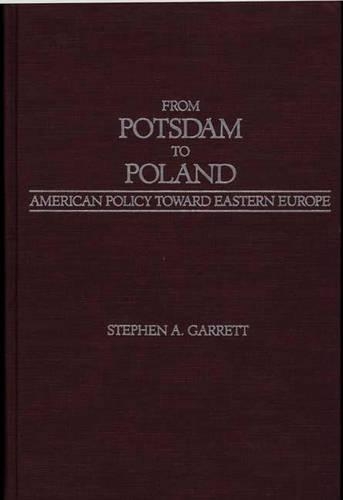
From Potsdam to Poland: American Policy toward Eastern Europe
(Hardback)
Publishing Details
From Potsdam to Poland: American Policy toward Eastern Europe
By (Author) Stephen A. Garrett
Bloomsbury Publishing PLC
Praeger Publishers Inc
8th December 1986
United States
Classifications
Tertiary Education
Non Fiction
327.73047
Physical Properties
Hardback
246
Description
This authoritative volume analyzes decision-making in American foreign policy using Eastern Europe as a case study. It focuses on specific functional issues, such as the influence of the American-Eastern European ethnic population on policy, the economic relationship between the U.S. and Eastern Europe, and the effect American human rights policies have on its dealings with the region. While focusing on this one region, From Potsdam to Poland also considers the intellectual and moral dilemmas that confront the United States in formulating its foreign policy.
Reviews
. . . a useful compendium of data on the history of United States policy toward Eastern Europe.-Slavic Review
Garrett's book is primarily an analysis of three major issues or myths that have affected US--Eastern European relations since WW II. He investigates the impact of Eastern European ethnicity on American foreign policy, the interaction between econimics and politics in American-East European trade, and the struggles between geographical and humanitarian principles in the formulation of US policy toward Easter Europe. Like many who write about Eastern Europe, Garrett contrasts idealism and realism in discussing history and current affairs. He concludes that the US faces grave limitations in its abilities to affect events in the region. In a concluding chapter, Garrett presents a balanced, nonprovocative recipe for the future: he calls for Eastern Europe to model itself on independent Finland, establishing a pluralistic, democratic society that always maintains a special relationship with the USSR. The book has an excellent bibliography of current and retrospective works on US-Eastern European relations. Other works in this field are outdated. Strongly recommended for upper-division and graduate libraries that specialize in national security and foreign policy.-Choice
." . . a useful compendium of data on the history of United States policy toward Eastern Europe."-Slavic Review
"Garrett's book is primarily an analysis of three major issues or myths that have affected US--Eastern European relations since WW II. He investigates the impact of Eastern European ethnicity on American foreign policy, the interaction between econimics and politics in American-East European trade, and the struggles between geographical and humanitarian principles in the formulation of US policy toward Easter Europe. Like many who write about Eastern Europe, Garrett contrasts idealism and realism in discussing history and current affairs. He concludes that the US faces grave limitations in its abilities to affect events in the region. In a concluding chapter, Garrett presents a balanced, nonprovocative recipe for the future: he calls for Eastern Europe to model itself on independent Finland, establishing a pluralistic, democratic society that always maintains a special relationship with the USSR. The book has an excellent bibliography of current and retrospective works on US-Eastern European relations. Other works in this field are outdated. Strongly recommended for upper-division and graduate libraries that specialize in national security and foreign policy."-Choice
Author Bio
STEPHEN A. GARRETT is Professor of International Policy Studies at the Monterey Institute of International Studies./e He has previously taught at the University of Virginia, the American University of Beirut, and the Naval Postgraduate School. He has published five books and over forty articles on topics in international affairs.
